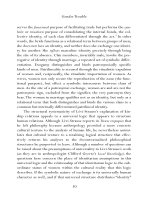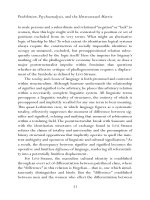GENDER TROUBLE 93
Bạn đang xem bản rút gọn của tài liệu. Xem và tải ngay bản đầy đủ của tài liệu tại đây (20.63 KB, 1 trang )
Gender Trouble
serves. But further, this dependency, although denied, is also pursued by
the masculine subject, for the woman as reassuring sign is the displaced
maternal body, the vain but persistent promise of the recovery of preindividuated jouissance. The conflict of masculinity appears, then, to be
precisely the demand for a full recognition of autonomy that will also
and nevertheless promise a return to those full pleasures prior to
repression and individuation.
Women are said to “be” the Phallus in the sense that they maintain
the power to reflect or represent the “reality” of the self-grounding
postures of the masculine subject, a power which, if withdrawn, would
break up the foundational illusions of the masculine subject position.
In order to “be” the Phallus, the reflector and guarantor of an apparent
masculine subject position, women must become, must “be” (in the
sense of “posture as if they were”) precisely what men are not and, in
their very lack, establish the essential function of men. Hence, “being”
the Phallus is always a “being for” a masculine subject who seeks to
reconfirm and augment his identity through the recognition of that
“being for.” In a strong sense, Lacan disputes the notion that men signify
the meaning of women or that women signify the meaning of men. The
division and exchange between this “being” and “having” the Phallus is
established by the Symbolic, the paternal law. Part of the comedic
dimension of this failed model of reciprocity, of course, is that both
masculine and feminine positions are signified, the signifier belonging
to the Symbolic that can never be assumed in more than token form by
either position.
To be the Phallus is to be signified by the paternal law, to be both its
object and its instrument and, in structuralist terms, the “sign” and
promise of its power. Hence, as the constituted or signified object of
exchange through which the paternal law extends its power and the
mode in which it appears, women are said to be the Phallus, that is, the
emblem of its continuing circulation. But this “being” the Phallus is
necessarily dissatisfying to the extent that women can never fully
reflect that law; some feminists argue that it requires a renunciation of
58









